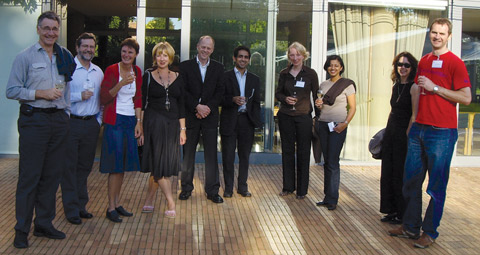Australian-based researchers are participating in an international collaboration to improve general practice research
Primary care is where most patients receive most of their health care. It makes a greater contribution to the community’s health than specialty practice.1,2 Yet research in primary care lags far behind that in the specialties; it is a “Cinderella”, criticised for its comparatively small output and its lack of relevance and methodological rigour.3-6 This discordance has focused attention on the need to strengthen primary care research infrastructure and capacity.7,8 In Australia, the federal government responded with the Primary Health Care Research, Evaluation and Development program.9
The Brisbane International Initiative (BII) is another approach with similar — but international — objectives. Wide-ranging and ambitious, it was founded at a Brisbane meeting of leaders in primary care research from eight countries in 2002.10 Its aim is to develop expertise in primary care through promoting capacity and fostering excellence in primary care research. It now operates within the World Organization of Family Doctors (WONCA). Originally a collaboration of 14 university departments of general practice (in North America, the United Kingdom, Europe and Australia), the BII has since expanded and promotes primary care research capacity-building through a range of activities (Box 1).
One of these activities is the convening of postdoctoral peer-learning cohorts in a 2-year program of development for research leadership administered at the University of Oxford in the UK. We were among the second (2007) cohort of 12 researchers (Box 2): two of us are Australian (P J M and J S F), and the third (M L v D), originally from the University of Ghent, has since taken up an academic position in Australia. The 2-year program has a flexible overall structure but begins and concludes with meetings at the host institution. The initial meeting for our cohort was held on 3–6 September 2007 at St Hugh’s College, Oxford (Box 3).
The meeting had a conventional structure — seminars, talks and workshops — but stood out for the quality of its content. It was designed and seamlessly facilitated by Alison Ward (Research Support Director, Department of Primary Health Care, University of Oxford). Box 4 outlines the material covered and the impressive range of presenters. However, the meeting had a further agenda: the smallness of the group, the cloistered surroundings, and the privileged access to distinguished and influential people in the field of primary care research instilled in us a sense of responsibility; the meeting also introduced us to international peers at a similar career stage and, specifically, gave us an opportunity to plan collaborations.
The Australian BII participants are developing other collaborations. These include an article on journal impact factors and their influence on research and researchers (lead author, M L v D).11 P J M has developed a collaboration to study GP referral patterns for transient ischaemic attack and is exchanging ideas with another group member on parallel projects on inappropriate prescribing in older people. Undergraduate students from the University of Aberdeen, Scotland, may be offered the opportunity to complete an elective research term in a collaborating department at the University of Newcastle, Australia. P J M will also make short visits, facilitated by colleagues at Keele University, the University of Sheffield, the University of East Anglia and University College London, to study the organisation and functioning of British research networks of general practices. In addition, the Australian-based BII participants hosted a breakfast meeting at the national General Practice and Primary Health Care Research Conference in Hobart in June to explore the possibility of local Australian postdoctoral peer-learning groups. These may be modelled on the experience of Andrew Farmer (Lecturer in General Practice, University of Oxford) who spoke at the BII meeting of his experience as a member of a Medical Research Council peer-learning group of postdoctoral primary care researchers.
4 Program of the 2007 meeting
Skill development for leadership. Seminars on:
leadership theory (Sue Dopson, Reader in Organisational Behaviour, University of Oxford);
the research–policy nexus (Martin Roland, Director, National Primary Care Research and Development Centre, University of Manchester); and
scenario planning for anticipating future strategy and policy in primary care (Sara Ward, Executive Director, James Martin Institute for Science and Civilization, University of Oxford).
Received 7 April 2008, accepted 19 May 2008
- Parker J Magin1
- John S Furler2
- Mieke L van Driel3
- 1 Discipline of General Practice, University of Newcastle, Newcastle, NSW.
- 2 Department of General Practice, University of Melbourne, Melbourne, VIC.
- 3 Faculty of Health Sciences and Medicine, Bond University, Gold Coast, QLD.
- 1. Starfield B, Shi L, Macinko J. Contribution of primary care to health systems and health. Milbank Q 2005; 83: 457-502.
- 2. Shi L, Macinko J, Starfield B, et al. The relationship between primary care, income inequality, and mortality in US states, 1980–1995. J Am Board Fam Pract 2003; 16: 412-422.
- 3. Van Der Weyden MB. General practice research in Australia: a timely reality check [editorial]. Med J Aust 2000; 173: 569-570. <MJA full text>
- 4. Askew D, Glasziou P, Del Mar C. Research output of Australian general practice: a comparison with medicine, surgery and public health. Med J Aust 2001; 175: 77-80.
- 5. Thomas T, Fahey T, Somerset M. The content and methodology of research papers published in three United Kingdom primary care journals. Br J Gen Pract 1998; 48: 1229-1232.
- 6. Horton R. Evidence and primary care. Lancet 1999; 353: 609-610.
- 7. Beasley J, Starfield B, van Weel C, et al. Global health and primary care research. J Am Board Fam Med 2007; 20: 518-526.
- 8. Del Mar C, Askew D. Building family/general practice research capacity. Ann Fam Med 2004; 2 Suppl 2: S35-S40.
- 9. Primary Health Care Research and Information Service [website]. http://www.phcris.org.au/phcred/ (accessed Mar 2008).
- 10. Beasley J, Jan Dinant G, Dobbs F, et al. The Brisbane Initiative: international education for leadership in primary care research. WONCA News 2004; Jun. http://www.globalfamilydoctor.com/publications/news/june% 202004/health.htm (accessed May 2008).
- 11. van Driel M, Magin P, Del Mar C, et al. Journal impact factor, and its importance for the AFP. Aust Fam Physician 2008. In press.






